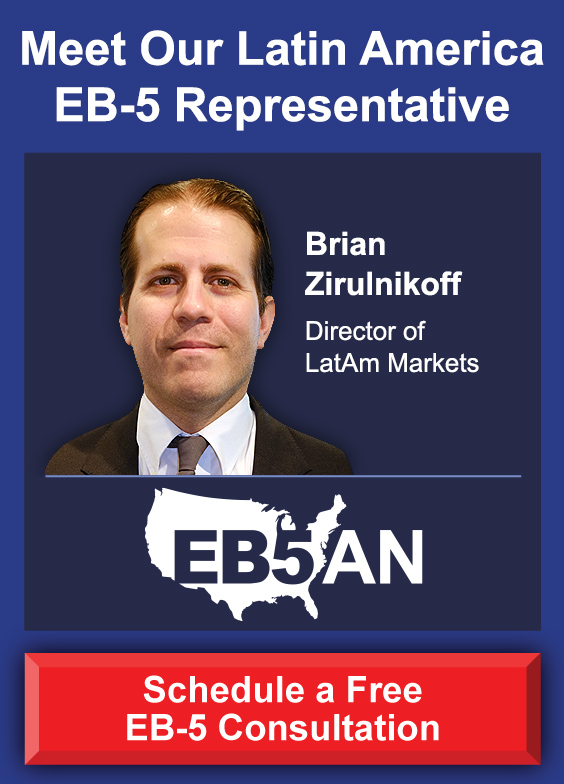
Having a Green Card offers numerous immediate advantages to EB-5 investors, yet it’s their children and family members who stand to gain even more in the long run, including the chance to study, work, and reside in the United States indefinitely. Through the avenues opened by EB5 investments, the children and families of investors have the opportunity to build prosperous lives in the U.S., benefiting from the rights and privileges that come with permanent residency.
In this article, we will explore numerous advantages the EB-5 program offers to investors with families, particularly those with children.
Understanding the EB-5 Visa Program
Advantages of a Green Card
- General Benefits of Green Cards
- Advantages for Children
- Educational Advantages for Students
- Family-Wide Rewards
Key Insights to Remember
Work with EB5AN to Maximize Benefits
Understanding the EB-5 Visa Program

The EB5 visa program serves as a pathway for investors to gain Green Cards by investing in the U.S. economy. Through the EB-5 visa, investors secure the ability to live in the United States without requiring an employment or visa sponsor. It also eliminates the need for an H-1B visa to be employed by U.S. companies.
Application Process
An EB-5 application starts with a qualifying investment. Following this investment, EB-5 investors must submit Form I-526E, accompanied by evidence proving their investment aligns with program stipulations (details provided below). Then, investors present within the United States need to submit Form I-485 to adjust their status. Those outside the United States should apply using form DS-260. A policy revision in March 2022 now permits investors within the United States to concurrently file Form I-526E and Form I-485, eliminating the necessity to await approval of Form I-526E before proceeding with the I-485 application.
Eligibility Criteria
- Capital utilized for EB-5 investments needs to be obtained through lawful means and remain at risk for the duration of the investment.
- Investments through the EB-5 program should either establish a new commercial enterprise or aid in the recovery of a struggling business.
- It’s mandatory for EB-5 investments to generate a minimum of 10 employment opportunities for eligible American workers. These positions should be maintained for at least two years, although they do not have to be occupied by the same individuals throughout this timeframe.
- For EB5 projects situated in designated Targeted Employment Areas (TEAs), the investment threshold is set at a minimum of $800,000. For projects outside of these areas, the minimum investment rises to $1,050,000.
The EB-5 program ranks as one of the most straightforward routes to U.S. residency and, ultimately, citizenship for individuals with sufficient funds. Through EB-5 investments, investors gain the opportunity to obtain Green Cards for themselves and their eligible family members, namely their spouses and unmarried children under the age of 21. Acquiring U.S. Green Cards for the entire family offers numerous advantages, many of which will be thoroughly detailed below.
Advantages of a Green Card

Holding a U.S. Green Card offers numerous advantages to foreign nationals, particularly for EB-5 investors with children.
General Benefits of Green Cards
Green Card holders enjoy the freedom to travel without restrictions. Unlike individuals on more limited visas, those with Green Cards can depart and re-enter the U.S. without the risk of being denied entry, provided they return within a year of leaving. Additionally, Green Card holders are eligible to work for any employer in the U.S., including many state and local government positions and jobs requiring security clearance.
Under the law, Green Card holders are afforded protections similar to those of U.S. citizens, alongside most rights citizens have. Green Card holders are also able to engage in the U.S. political landscape by contributing to and volunteering for political campaigns.
Advantages for Children
A key advantage of an EB5 Green Card is access to the U.S. educational system, allowing EB-5 investors to enroll their children in public schools from kindergarten through high school at no additional cost. Children of EB-5 investors can undergo their full primary and secondary education in the U.S.
Beyond the direct benefits of an American education, children holding Green Cards also gain the advantage of learning English in a native setting. Proficiency in English, a language prevalently used in global business, equips children with a valuable skill set, enhancing their future career opportunities and enabling them to achieve fluency on par with native speakers if they start learning early.
U.S.-educated children are well-positioned for higher education within the country. With the support of experienced teachers and administrators in navigating the college admissions process, students can easily access guidance and prepare for required tests like the SAT and ACT, facilitating their college applications.
Having been accustomed to the U.S. educational environment, these children face a shorter adjustment period when entering American colleges compared to international students. Furthermore, Green Card holders educated in the U.S. are more likely to meet the English proficiency requirements of most colleges without difficulty.
The EB5 program extends benefits to adult children as well; parents can fund an EB-5 investment on their behalf, offering a pathway to a Green Card. This option is particularly appealing for parents not seeking U.S. residency themselves and for those with children who are married or above the age of 21.
Educational Advantages for Students
Students holding EB-5 visas are classified as U.S. residents, positioning them alongside U.S. citizen applicants in the college admissions process rather than with international student applicants. This status is advantageous, as many colleges limit the number of international students they admit to ensure availability for U.S. students. Permanent residents bypass these limits, enhancing their chances of acceptance into U.S. colleges compared to their international counterparts.
Tuition fees in the U.S. are notably higher for international students, but Green Cards can significantly reduce these costs. Resident students may qualify for in-state tuition rates at public colleges, which are substantially lower than tuition fees for out-of-state or international students.
Moreover, Green Card holders have access to a broader range of scholarships and financial aid opportunities that are exclusive to U.S. citizens and permanent residents.
One significant benefit for students with Green Cards is the ability to work without the limitations faced by those on student visas, who are typically restricted to on-campus employment. Permanent residents can work any job, participate in internships, and pursue employment opportunities after graduation without restrictions.
Unlike international students, who may need to renew their visas during their studies, Green Card holders are exempt from this requirement, avoiding the complexity of the U.S. immigration system during their education.
Post-graduation plans are also more straightforward for Green Card holders compared to students on visas. While those on student visas often need to get another visa or return home after their studies, Green Card holders are free to remain in the U.S., pursue employment, and engage in post-graduate opportunities without the need to adjust their status or secure employment sponsorship.
Family-Wide Rewards
Obtaining a Green Card through the EB-5 program enables investors to establish a foundation for their family members to build their lives in the United States. The “jus soli” principle, or right of the soil, ensures that children born in the U.S. automatically receive U.S. citizenship.
So, investors opting to start or expand their families in the U.S. are essentially providing their U.S.-born children with the privilege of U.S. citizenship. This legacy of citizenship can extend to future generations, as U.S. law allows for citizenship by descent if one parent is a U.S. citizen. The long-term advantages of acquiring a Green Card through the EB5 program can span multiple generations.
Beyond obtaining Green Cards for their spouses and unmarried children under the age of 21, EB-5 Green Card holders also have the capability to sponsor additional family members for Green Cards. This includes unmarried children of any age.
Another advantage of having a U.S. Green Card is entry into the American healthcare system, renowned for hosting some of the finest hospitals, medical schools, and research institutions globally, along with cutting-edge healthcare technologies. EB-5 investors with Green Cards can obtain health insurance and access top-tier medical care. They may also qualify for social security benefits, which could include financial aid.
Green Cards also permit EB5 investors to spend their retirement years in the U.S. Contrary to popular belief, a tourist visa is not sufficient for retirement in the country. Although a tourist visa is valid for a decade, it only allows for a six-month stay per visit. On the other hand, Green Card holders can reside in the U.S. indefinitely, making the EB5 program an ideal route for those seeking retirement in the United States.
Key Insights to Remember

While enjoying numerous benefits, Green Card holders also face certain limitations. These include:
- Green Cards need to be renewed every ten years.
- Holders of Green Cards are not entitled to U.S. passports.
- Children born abroad to Green Card holders are not automatically eligible for Green Cards themselves.
- Having a Green Card does not grant the right to participate in U.S. elections through voting.
- Green Card holders cannot seek elected political positions in the U.S.
- Protected against deportation under most circumstances, Green Card holders can still face deportation for legal violations or criminal activities.
- It’s mandatory for Green Card holders to carry their Green Cards at all times, with failure to do so potentially leading to a 30-day jail sentence.
- Green Card holders need to take additional steps to secure their re-entry into the U.S. if they will stay abroad for a long time.
- Green Card holders planning to stay outside the U.S. for an extended period of time may risk losing their status.
- Green Card holders are required to file annual income tax returns with the IRS and their residing state’s tax authority (although some states do not impose state income tax).
- Male Green Card holders aged between 18 and 25 are obliged to register with the Selective Service, despite the last U.S. military draft occurring in 1973.
Work with EB5AN to Maximize Benefits

By participating in the EB-5 program, foreign investors can gain U.S. residency benefits and even pursue U.S. citizenship later on. To successfully navigate every step of this process, it is highly advisable to seek help from industry experts.
EB5AN has helped more than 2,300 families from 60 countries relocate to the United States as lawful permanent residents. Our expert team has more than a decade of experience, and offers clients first-rate, low-risk EB-5 regional center projects with 100% USCIS project approval rate to date.
If you are a prospective EB-5 investor seeking to explore how this program can provide your family with vast opportunities, book a free call with our EB-5 team today.











